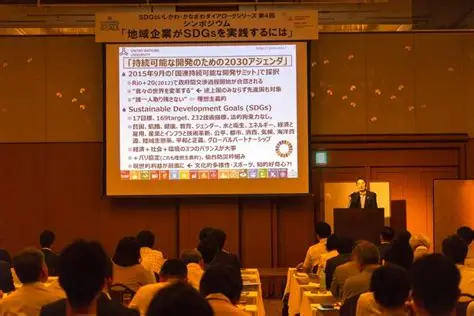The fourth event in the series was a two-part symposium on how the SDGs are being utilized in business.
Part 1 began with a keynote speech from Taikan Oki (Senior Vice-Rector, UNU) on international trends and the significance of the SDGs for companies. According to Prof. Oki, while still too few people and companies are implementing the SDGs, certain trends are emerging in the world, such as retailers refusing to carry products from companies that aren’t addressing gender issues, suggesting that a failure to implement the SDGs could impact business. Working toward the SDGs presents a major business opportunity, said Prof. Oki, as it builds better relationships with stakeholders and opens doors to new partnerships. He closed by urging businesses to “think about what you can do to make the world a better place and participate in the 2030 Agenda as an active player.”
In the subsequent panel discussion, the panelists, pioneers of SDGs action, presented case studies and discussed what it takes to turn global and local issues into business opportunities. Moderator Tokutaro Hiramoto (Director, SDGs Promotion Center, Kanazawa Institute of Technology) closed the panel discussion in Part 1 with the comment, “We welcome new initiatives in Kanazawa that will enhance our sustainability in terms of the SDGs and allow engaged companies to grow sustainably. I think this discussion has given us some clues.”
In Part 2, Kae Ishikawa (Director of the UN Women Japan Liaison Office) spoke on the opportunities of incorporating gender equality into business practice and discussed with the panelists observations made when advancing equality and the true meaning of women’s empowerment. Examples of Ishikawa companies that are taking steps toward workstyle reform and social responsibility were introduced and a passionate discussion unfolded around topics such as the commitment required from executives and senior managers and the importance of awareness changes among men and women alike. Another point made was the fact that promoting women in the workplace is advantageous for business and that gender-diverse companies perform better than their peers, as evident in the recent spread of ESG investment, in which investors prioritize companies committed to ecology, society, and governance. Ishikawa closed by saying, “Empowering women was previously something companies felt they had to do. I hope to see companies approach it from a different mindset, that empowering women makes the business stronger and more competitive.”




